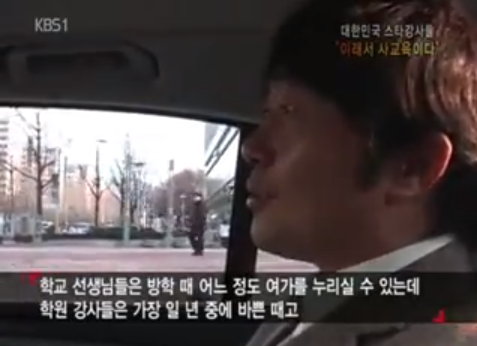Korea's million dollar private teachers


You may think that a teacher could only achieve rock star status and be paid millions in some alternate universe. However, it's really happening in South Korea - in the private sector.
The Wall Street Journal ran a guest article by Amanda Ripley, an Emerson Fellow at the New America Foundation, who wrote about Korean teacher Kim Ki-hoon in an education feature over the weekend. Mr. Kim is part of a shadow system that employees more teachers than Korea's more mainstream schools. Korea is a world leader in education, so Ripley sought to learn what is working so well there.
The New America Foundation is a Washington think tank that is chaired by Google CEO Eric Schmidt. Its current CEO is famed The New Yorker journalist Steve Coll.
Many of Kim's students are the children of the elite who can afford a private tutor and classes are given entirely online. Korea has developed a "free market for teaching" due to demand for quality instruction at after hours schools called hagwons, Ripley said. Contrast that with the U.S. where the highest paid public education employee is probably a college football coach.
"....price is at least loosely related to quality, which is precisely the problem. The most affluent kids can afford one-on-one tutoring with the most popular instructors, while others attend inferior hagwons with huge class sizes and less reliable instruction-or after-hours sessions offered free by their public schools. Eight out of 10 South Korean parents say they feel financial pressure from hagwon tuition costs. Still, most keep paying the fees, convinced that the more they pay, the more their children will learn," Ripley said.
Interestingly, Mr. Kim told the Journal that the solution to stifle rising costs was to improve public education. He suggested that performance based pay for teacher would help and said that public schools should offer more attractive salaries.
That still may not address access to quality, however. The U.S public education system is a good example of that. The College Board, the non-profit that's behind that's SATS, issued a report in February saying record numbers of U.S. students were taking advanced placement, yet the U.S. has been descending in world education rankings and some states are doing dismal jobs preparing students for careers in science, technology, engineering and math. Access to quality education comes down to a function of income.
Who is taking the AP exams? It's the mostly white and affluent students, the U.S. Department of Education's Equity and Excellence Commission recently found. "Those who attend schools in high poverty neighborhoods are getting an education that more closely approximates schools in developing nations," it said.
Should a student's academic potential be related to their parent's incomes?
image credit: youtube
This post was originally published on Smartplanet.com